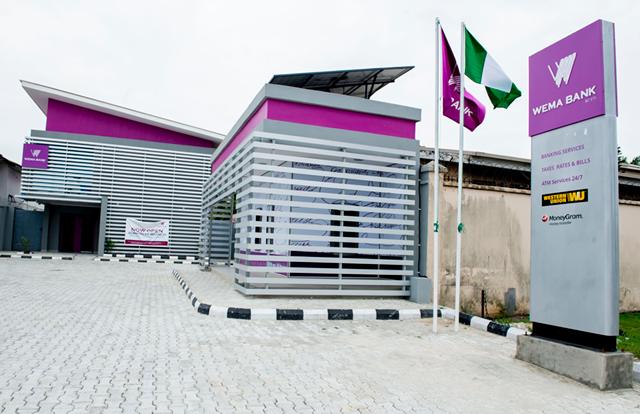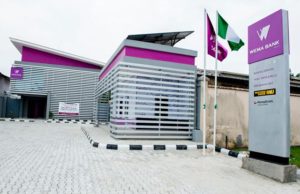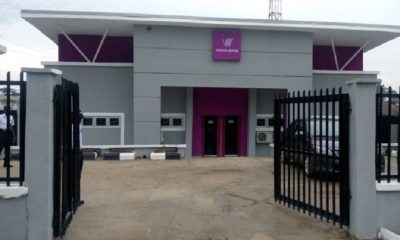Banking
Wema Bank Grows Gross Earnings By 16.36% In Q3 2016


By Modupe Gbadeyanka
Despite the harsh operating environment and economic situation in Nigeria, Wema Bank has continued to record a quantum growth. This has made it one of the most trusted financial institutions in the country.
Some have attributed this to the leadership style of its Managing Director, Mr Segun Oloketuyi, who since assuming office, has repositioned the bank into a dependable brand. No wonder the Bank of Uganda was in Nigeria to learn from Wema Bank few weeks ago.
In its unaudited financial results for the nine months ended September 30, 2016, Wema Bank’s gross earnings grew by 16.36 percent to N37.89 billion from N32.57 billion it recorded in the same period last year.
In the results obtained by Business Post, the bank showed a modest improvement in operating indices.
This is despite the domestic environment remaining largely strained.
Nigeria’s August 2016 manufacturing and non-manufacturing PMI data showed underperformance(s) at 42.1 index points and 43.7 index points respectively.
Also, inflation maintained an upward trend from 17.6% (August 2016) to 17.9% (September 2016), though at a slower pace (May – September 2016), as rising interest rate and foreign exchange illiquidity continue to impact prices.
But in all these, Wema Bank maintained its commitment to innovation, introducing *945# and other digital initiatives.
These efforts continue to engender confidence with the bank’s customers, leading to a growth in savings deposits by 18.10% from N35.58 billion as at December 2015 to N42.02 billion as at the end of the period.
The bank optimized its balance sheet, as loans to customers rose by 20.78% to N177.01 billion with interest income expanding by 20.12 percent to N31.93 billion compared to last year while fees and commission increased by 16.79 percent to N4.41 billion.
Explaining how the bank was able to record successes despite the odds, MD/CEO of Wema Bank, Mr Segun Oloketuyi, explained that, “the streamlining of our processes and the leverage on technology led to improving efficiencies and cost optimisation, with operating expense declining by 1.77% Y-o-Y from N17.49 billion in September 2015 to N17.18 billion in September 2016 compared to a general inflation level of 17.9%.”
Mr Oloketuyi noted that, “We will continue to seek opportunities to improve our cost-to-serve through alternative channels and continued strategic improvements of our business model without compromising our service quality.”
“Our prudent risk management model continues to enable us deal with the industry-wide spikes in loan defaults and attendant rise in Non-Performing Loans (NPL).
“The NPL ratio for the Bank stood at 2.99% as at Q3’16 which is below the regulatory threshold of 5%. The coverage ratio for the Bank remained adequate at 124.82%,” he added.
“Going into the final quarter of the year, we do not envisage any material improvement in the operating environment,” he submitted, noting that, “Rather, we expect the gains of the fiscal and monetary policies to impact between Q1 & Q2’ 2017.”
“However, we believe we would close the year with improved performance,” he expressed optimism.
Mr Oloketuyi also declared that, “We are pleased to announce that we just concluded a Tier II capital raise of N20 billion.”
“This will boost our Capital Adequacy Ratio (CAR), currently at 13.36% (pre-capital raise) and supporting our medium term growth plan. More information will be provided once we obtain final regulatory approval,” he explained.
Banking
CIBN to Back ACAMB on Professional Development, Industry Advocacy

By Modupe Gbadeyanka
The Chartered Institute of Bankers of Nigeria (CIBN) has promised to support the ambitious plans of the Association of Corporate and Marketing Professionals in Banks (ACAMB).
At a meeting between the leaderships of the two organisations on Tuesday, the president of CIBN, Professor Pius Deji Olanrewaju, said it was impressed with the capability development and the undergraduate mentorship schemes of ACAMB under its leader, Mr Jide Sipe.
The CIBN chief commended the forward-thinking vision of the group, saying it had raised standards across Nigeria’s banking sector.
“ACAMB’s support has given CIBN and the banking sector brand equity,” he said, praising the association’s record in reputation management. recalling ACAMB’s role in addressing crises within the sector, describing the partnership as strategic and beneficial.
He further pledged support for ACAMB’s 30th anniversary in September 2026, its AGM, and other programmes, including fundraising initiatives.
“I want to assure you that everything you have presented today has been clearly noted and will be acted upon.
“We are fully committed to working closely with you so as to translate these discussions and vision into measurable progress. Our shared goal is to strengthen the sector, protect its reputation, and enhance its public image in a meaningful and lasting way.
“This meeting discussed various initiatives and reforms crucial for the future of our industry, including the need for continuous training and adaptation to new programs,” Mr Olanrewaju stated.
Speaking at the meeting, the president of ACAMB described the visit as a crucial first step in his tenure, aimed at contributing significantly to giving flight to his vision and that of ACAMB.
“When we assumed office, one of the first things we agreed on was the need to visit key stakeholders.
“However, before reaching out more broadly, we felt it was important to begin with our primary constituency and core stakeholders. We want them to understand the direction we are taking and to support the work we are doing, so that ACAMB can achieve greater success than it has in the past.
“We couldn’t have properly started our tenure without this very important meeting with the CIBN,” Mr Sipe stated
He introduced the newly constituted ACAMB Exco, which includes the 2nd Vice President, Morolake Phillip-Ladipo; General Secretary, Olugbenga Owootomo; Assistant General Secretary, Ademola Adeshola; Publicity Secretary, Abiodun Coker; and Executive Secretary, Fadekemi Ajakaiye.
Banking
All Set for Second HerFidelity Apprenticeship Programme

By Modupe Gbadeyanka
Registration for the second HerFidelity Apprenticeship Programme (HAP 2.0) organised by Fidelity Bank Plc has commenced.
The Divisional Head of Product Development at Fidelity Bank, Mr Osita Ede, informed newsmen that the initiative was designed to empower women with sustainable entrepreneurship skills.
The lender created the flagship women-empowerment initiative to equip women with practical, income‑generating skills and structured pathways to entrepreneurship.
“HerFidelity Apprenticeship Programme 2.0 reflects our commitment to continuous improvement. Having evaluated feedback from the first edition, we have returned with stronger partnerships and deeper mentorship programmes to ensure that women acquire not just skills, but sustainable economic opportunities,” he said.
“At the heart of the programme is guided, real‑world learning. Participants will undergo intensive apprenticeship training under reputable institutions and industry experts across select fields such as hair styling, shoe making, auto mechatronics, and interior decoration,” Mr Ede added.
He noted that HerFidelity Apprenticeship Programme 2.0 goes beyond skills acquisition by offering participants a wide range of business advisory services. These include business and financial literacy training, mentorship support throughout the apprenticeship journey, access to Fidelity Bank’s women‑focused and SME financial solutions, as well as guidance on business formalisation and growth strategies.
Further emphasising the bank’s vision, Mr Ede said, “By integrating structured mentorship with entrepreneurial development, Fidelity Bank is positioning women not just as trainees, but as future employers, innovators, and economic contributors within their communities. This aligns with our mandate to help individuals grow, businesses thrive, and economies prosper.”
Banking
The Alternative Bank Opens New Branch in Ondo

By Modupe Gbadeyanka
A new branch of The Alternative Bank (AltBank) has been opened in Ondo State as part of the expansion drive of the financial institution.
A statement from the company disclosed that the new branch would support export-oriented agribusinesses through Letters of Credit and commodity-backed trade finance, ensuring that local producers can scale beyond state borders.
For SMEs, the bank is introducing robust payment rails, asset financing for equipment and inventory, and supply chain-backed facilities that strengthen working capital without trapping businesses in interest-based debt cycles.
The Governor of Ondo State, Mr Lucky Aiyedatiwa, represented by his Chief of
Staff, Mr Olusegun Omojuwa, at the commissioning of the branch, underscored the importance of financial institutions in economic development.
“The pivotal role of financial institutions to economic growth and development of any economy cannot be overemphasised. It provides access to capital, supporting small and medium-scale enterprises and encouraging savings.
“Therefore, I have no doubt in my mind that the presence of The Alternative Bank in Ondo State will deepen financial services, create employment opportunities and stimulate economic activities across various sectors,” he said.
In her remarks, the Executive Director for Commercial and Institutional Banking (Lagos and South West) at The Alternative Bank, Mrs Korede Demola-Adeniyi, commended the state government’s leadership and outlined the lender’s long-term vision for Ondo State.
“As Ondo State steps into its next fifty years, and into the future anchored on the sustainable development championed during the recent anniversary celebrations, The Alternative Bank is here to be the financial engine for that vision. We didn’t come to Akure to hang banners. We came to fund work, farms, shops, and factories.”
With Ondo State’s economy anchored largely on agriculture, particularly cocoa production, poultry farming, and other cash crops, alongside a growing SME and trade ecosystem, AltBank is deploying sector-specific financing solutions tailored to these strengths.
For cocoa aggregators, processors and poultry operators, the bank will provide production financing, facility expansion support, machinery lease structures, and structured trade facilities under its joint venture and cost-plus financing models, with transaction cycles of up to 180 days for commodity trades and longer-term structured asset financing for equipment and infrastructure.
The organisation is a notable national non-interest bank with a physical network now surpassing 170 locations, deploying capital to solve real-world challenges through initiatives such as the Mata Zalla project, which saw to the training of hundreds of women as electric tricycle drivers and mechanics.
-

 Feature/OPED6 years ago
Feature/OPED6 years agoDavos was Different this year
-
Travel/Tourism10 years ago
Lagos Seals Western Lodge Hotel In Ikorodu
-

 Showbiz3 years ago
Showbiz3 years agoEstranged Lover Releases Videos of Empress Njamah Bathing
-

 Banking8 years ago
Banking8 years agoSort Codes of GTBank Branches in Nigeria
-

 Economy3 years ago
Economy3 years agoSubsidy Removal: CNG at N130 Per Litre Cheaper Than Petrol—IPMAN
-

 Banking3 years ago
Banking3 years agoSort Codes of UBA Branches in Nigeria
-

 Banking3 years ago
Banking3 years agoFirst Bank Announces Planned Downtime
-

 Sports3 years ago
Sports3 years agoHighest Paid Nigerian Footballer – How Much Do Nigerian Footballers Earn




















